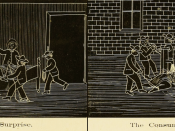Hazing is illegal in forty states across the country. When is it that harmless fun turns into hazing? Hazing according to "It's the Law" in The New York Times is "activities that endanger the mental and physical health of anyone" (qtd. in Bassin). If in fact hazing does occur, minuscule fines should be avoided and punishments should lead straight to the banning of the organization from the campus. First and foremost, hazing humiliates human beings both mentally and physically. The golden rule should apply but doesn't: Treat others the way you want to be treated. Second, hazing is not something that should be taken lightly. Hazing causes serious injury and in some cases leads up to death. Third, nothing is being done in order to put a stop to hazing. Many school officials hand out small punishments when larger road blocks should be used. Early interference may stop hazing activities in the future.
First, hazing humiliates human beings both mentally and physically. As written by Hank Nuwer in "Greek letters don't justify cult-like hazing of pledges" some activities that sororities and fraternities engage in are parallel to the activities that a cult group would participate in. Why is it that both society and legal officials shun those who participate in cult activities a great deal more than the organizations of a college campus who feel hazing is necessary? The activities that hazing entails are not those of a normal day. For instance, in June of 1998 players of a hockey team were suspended for one year for rubbing their genitals in the faces of rookies players. As well as that incident, in September of 1993 criminal charges were brought against another hockey team because of hazing activities than included drinking games, which end up in Thomas 2 vomiting, shaving of all pubic hair, and causing people to eat inedible concoctions. (O'Hara). According To "Greek letters dont justify cult-like hazing of pledges" Nuwer states that 20% of fraternity males "admitted" to being hazed. Just imagine how many were too scared to admit the truth. Within "The hell of hazing" O'Hara says that last year alone, 80% of college jocks were hazed. Hazing is not something that happens solely in the Greek community of universities. All organizations are capable of participating in these heinous acts.
Second, hazing causes serious injury and in come cases leads up to death. According to www.stophazing.org in a speech given by Robert McNamera his son was a victim to the crime of hazing. On November 20th 1992 Robert McNamera received a phone call saying there was an accident at the University of Vermont, the school in which his son Jon attended. Apparently he had slipped and fell, and was now dead. Apparently as a pledge, Jon's fraternity brought them up to Rock point, a dark cold mountain with the presence of alcohol. The story was that while putting out the bonfire, Jon slipped and feel onto rocks 80 feet below. According to Bill # 76 two sections were violated, section b and section c. Section B is " any activities that subjects the student of any unreasonable risk or harm" (www.stophazing.org). Section C is a little more tragic. Section C is " any activity involving the consumption of a food, liquid, alcoholic beverage, liquor, drug or any other substance which subjects students to any unreasonable risk of harm (www.stophazing.org). Jon's blood alcohol content (B.A.C) was at .125. Even though three students were charged with providing alcohol to a minor nothing evidently close to what needed to get done was completed. These three students got small fines, hours of community service, and their chapter was on social probation for 3 months. Social probation means that the Thomas 3 chapter can not have any parties. However, that doesn't mean that they don't. What a small price to pay for the life of someone so young.
Third, nothing is being done to put a stop to hazing. Punishments should lead straight to the banning of the organization from the campus. Banning the organization after a first offense would serve as a lesson to other chapters and possibly put as stop to hazing. Within another case at Texas A & M university, one man was hazed so badly that when he complained of pain while walking and went to the doctor, the doctor had to remove one of his testicles. The only punishment of the offender according to "Efforts to end fraternity hazing have largely flailed, critics charge" by Ben Gose was a $ 500 fine, and 80 hours of community service. If in fact the offender completes a probation period of 18 months this incident will no longer be on his permanent record. As stated by the lawyer of the victim "'here some kid goes and violates the law, and doesn't get any real punitive punishments'" (qtd. in Gose). Hazing is illegal in 40 states why aren't these criminals behind bars. If the situation was altered, for instance, if an adult was watching over a group of day campers and gave them alcohol and made them participate in humiliating activities the adult would be in jail for the rest of his life. Why is it any different for college students who engage in these harmful activities? Why is it that college officials "turn their heads" when incidents like this occur. Would a parent turn their head on their child? When parents send their children away to college they are putting their safety in the hands of, what they except to be, responsible adults.
Many students across the nation participate in hazing, but that doesn't make it right. Why would something that causes injury and death be a positive thing? In some cases the only reason Thomas 4 hazing occurs is because these rowdy young adults have nothing better to do with their time, and are looking to have a little "fun." Some argue that they have gone through it and so must everyone that comes after them. That is a bigger problem then realized. Hazing has a circuitous effect. Once an individual is hazed, they are going to want to haze those who follow even more than they were. Eventually the hazing activities are going to be so extremes that a case of death will be something normal and routine. Society as a whole needs to stop the problem before is becomes that bigger problem. Not all organizations have a hazing mentality. However, every organization, be it Greek or athletic, have to pay the consequences for the mistakes of another.
The media has yet to expose a case in which hazing has ended up in a positive note. Why Would something with no positive aspects become so popular among so many? In conclusion organizations found guilty of hazing should be banned from the university immediately. First, it humiliates many individuals mentally and physically. Second, hazing causes injury and death and third, nothing is being done to put a stop to this hideous acts of violence. The roadblocks to stop hazing must start somewhere. Put yourself in the shoes of Robert McNamera. There is nothing worse then receiving a phone call notifying you that one of your loved ones will not longer be with you. The worst thing about it: something could have been done in order to prevent the accident before it got this far.





